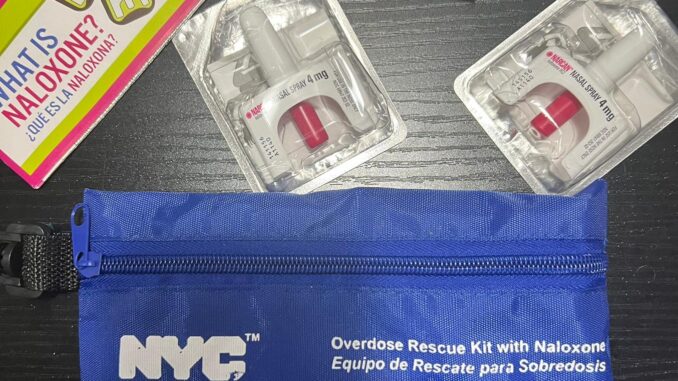
By Yassir Azzam
On Thursday, March 14, the Undergraduate Student Government (USG) hosted a “Narcan Training Event” in Brooklyn College’’s Student Center. The purpose of the event was to provide students with the knowledge and skills necessary to administer Naloxone Hydrochloride (“Narcan” for short)–a life-saving medication used to reverse the effects of opioid overdose.
The signs of an overdose include if the person is drowsy, passes out, having difficulty breathing, and has unusually small pupils. To the organizers of the event, hosting this workshop stemmed out of mutual aid campaigns working to provide citizens access to the drug.
“This project grew out of an initiative I started when I founded the [New York Public Interest Group (NYPIRG)] free store on campus and stocked it with Narcan,” Dylan Karlowski, USG Events Director and a senior at BC, told The Vanguard. “I wanted to make sure students had access to this life-saving drug.”
The crisis remains a top priority for NYC officials as overdoses continue to rise. According to the NYC Health Department’s quarter one statistics, every three hours, someone dies of a drug overdose in NYC. In the 1st quarter of 2023 alone 712 overdose deaths occurred in NYC, with the Bronx continuing to be the most impacted by overdose deaths. Mayor Adams announced on Dec. 6, 2023, an increased allocation of $12 million to fight the opioid overdose crisis, providing funding for treatment, outreach, and harm reduction organizations.
“The opioid epidemic is a crisis that impacts every corner of our city, tearing apart too many families and too many communities […] we will confront this crisis head-on by expanding treatment to increasing support for social services to help our communities recover and thrive,” Mayor Adams said. “These efforts will save countless lives.”
According to their mission statement, the NYC Health Department additionally offers training services to teach individuals how to administer Narcan, both virtually and in-person, to those experiencing an overdose. The city also provides treatment centers for people struggling with opioid addiction, recognizing that social services are critical to combating the crisis. The Department has also set up vending machines that dispense clean syringes and Narcan in low-income neighborhoods with limited access to such supplies.
“These vulnerabilities and the resulting deaths are as much a reflection of our lacking social supports as they are a historic lack of initiative in solving this specific problem. […] We have to make sure care is accessible for all,” Karlowski told The Vanguard.
While BC holds training on campus for students to partake in, organizers suggest that more can be done to combat the crisis.
“All colleges should hold Narcan trainings […] Our public health is a community concern, and the more tools we have to help each other, the better,” said Karlowski.
All New Yorkers can receive free naloxone and training from registered Opioid Overdose Prevention Programs (OOPPs) at NYC.gov/health/map.
